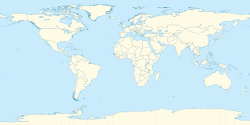Rock art of the Iberian Mediterranean Basin
Rock art of the Iberian Mediterranean Basin, or Levantine art, is a group of over 750 prehistoric sites.[1] They were declared a World Heritage Site by UNESCO in 1998.[1]
| UNESCO World Heritage Site | |
|---|---|
 Location of sites belonging to the Rock Art of the Mediterranean Basin on the Iberian Peninsula. | |
| Location | Spain |
| Criteria | Cultural: (iii) |
| Reference | 874 |
| Inscription | 1998 (22nd Session) |
| Coordinates | 39°47′24″N 1°02′00″W / 39.79000°N 1.03333°W |
The sites are in the eastern part of Spain. They show rock art from the Upper Paleolithic or (more likely) Mesolithic periods of the Stone Age.[2]
The art is small painted figures of humans and animals.[3] The earliest phases are of animals only.[3] They are the most advanced and widespread examples from this period, certainly in Europe. It is notable for the number of places included, the largest concentration of such art in Europe. Its name refers to the Mediterranean Basin. However, while some sites are near the sea, many of them are inland in Aragon and Castile-La Mancha. "Levantine Art" here means "from Eastern Spain", not the Levant region).
Examples
change-
Man gathering honey
-
An Elk
-
People and animals
-
Men in combat
-
People and animals
References
change- ↑ 1.0 1.1 A Companion to Rock Art, eds. Jo McDonald; Peter Veth (Hoboken, NJ: Wiley-Blackwell, 2012), p. 308
- ↑ Kalyan Kumar Chakravarty; Robert G. Bednarik, Indian Rock Art and Its Global Context (Delhi: Motilal Banarsidass Publishers; Bhopal: Indira Gandhi Rashtriya Manav Sangrahalaya, 1997), p. 210
- ↑ 3.0 3.1 The Figured Landscapes of Rock-Art: Looking at Pictures in Place, eds. George Nash; Christopher Chippindale (Cambridge: Cambridge university press, 2004), p. 24
